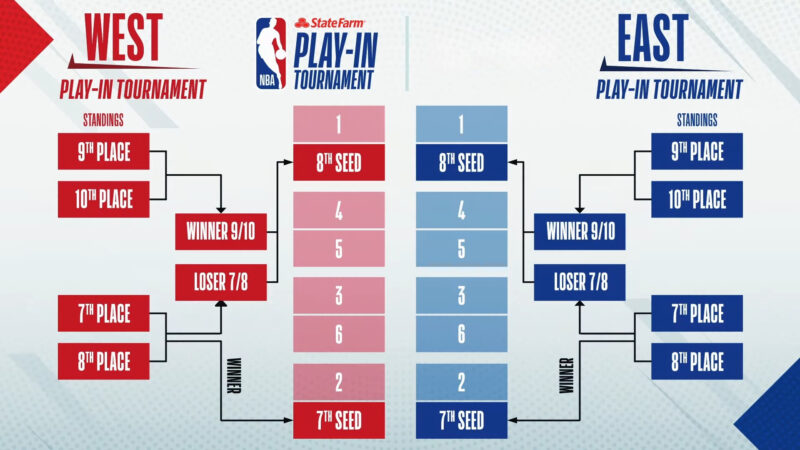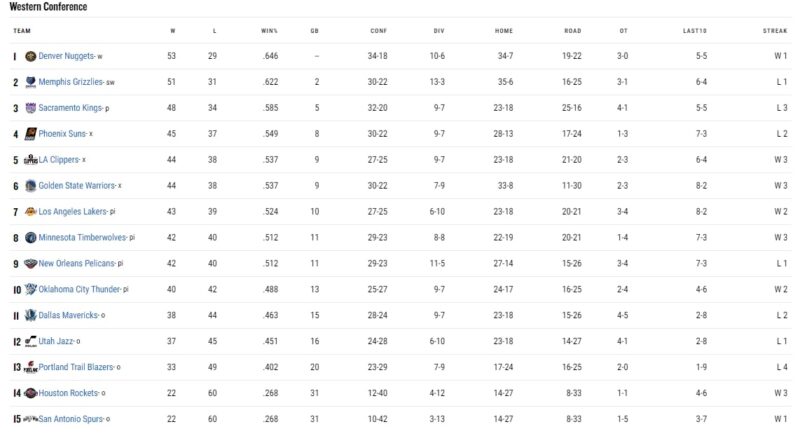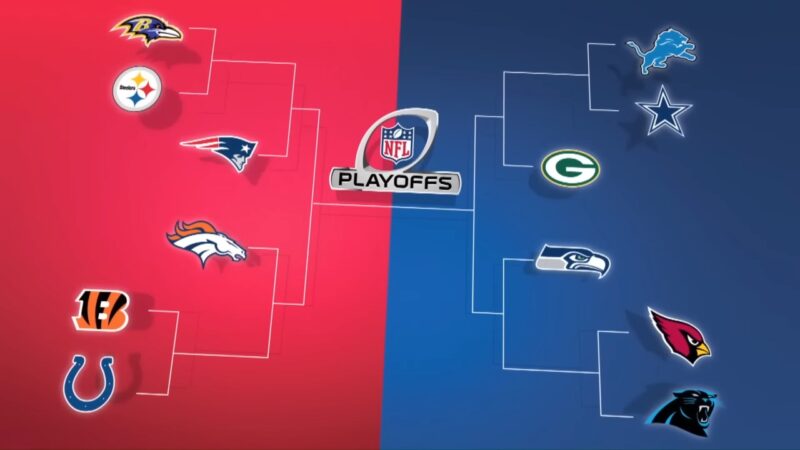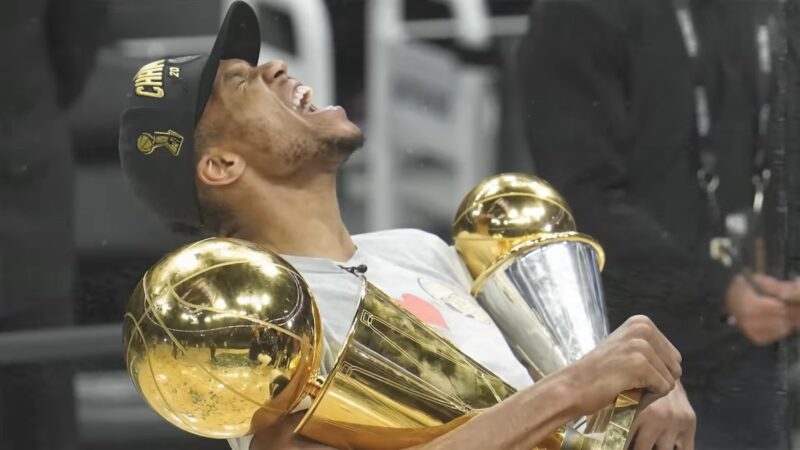If you love sports, you probably know that different leagues have different ways of deciding who makes it to the playoffs and who plays who.
The NBA is one of the most popular leagues in the world, but it also has a unique system of playoff seeding that is different from other leagues like the NFL.
In this post, I will discuss how the NBA does playoff seeding and answer the question: Does the NBA reseed in the playoffs?
We will look at how the NBA’s format works, how it compares to other leagues, and what would happen if it changed.
Key Takeaways
- The NBA does not reseed in the playoffs, maintaining a fixed bracket system where matchups are set once the postseason lineup is finalized.
- Unlike the NBA, the NFL is the only major professional sports league in the United States that reseeds during the playoffs.
- Arguments against reseeding in the NBA focus on preserving conference integrity and the tradition of the playoff format.
- Advocates for reseeding argue it could create a more competitively balanced playoff by ensuring top-seeded teams face the weakest remaining teams.
- The NBA has experimented with playoff format changes, such as the play-in tournament, but has not moved towards reseeding, reflecting a balance between tradition and potential innovation.
The NBA Playoff Format

At the core of the NBA playoffs is a fixed bracket system, predetermined once the postseason lineup is set.
Unlike the NFL, which reseeds teams after each round to ensure the highest-seeded team faces the lowest-seeded survivor, the NBA’s matchups are locked in from the start.
This means that if a lower-seeded team pulls off an upset, they do not then face the highest remaining seed; instead, they proceed along a pre-established path.
The Role of Regular Season Performance

Over an 82-game regular season, NBA teams vie for a favorable position in this playoff bracket.
Although division winners used to receive top seeding, recent adjustments have shifted focus toward overall conference standings.
Additionally, the introduction of a play-in tournament has added another layer of competition, allowing four teams from each conference to battle for playoff spots based on their regular season records.
The Case Against Reseeding
- Maintaining Conference Integrity: One of the arguments against reseeding in the NBA centers on the integrity of conference standings. Proponents of the fixed bracket format argue that it rewards teams for their performance throughout the regular season, ensuring that those who excel in their respective conferences are duly recognized and positioned.
- The Tradition and Predictability Factor: There’s also the aspect of tradition and predictability. Fans and teams alike prepare for the playoffs with a clear understanding of potential matchups, fostering rivalries and strategic preparations that might be diluted by a reseeding system.
The Argument for Reseeding
Ensuring Competitive Balance
On the flip side, advocates for reseeding argue that it could ensure a more competitively balanced playoff, where the top-seeded teams are rewarded with theoretically easier paths, thereby increasing the likelihood of the best teams advancing to the later rounds.
Also, teams that never won a championship would have a chance to battle the strongest teams and earn their right to glory.
The 2021 Experiment
We dig into the how and why of an NBA season that could look dramatically different in 2021-22: Shorter schedule, in-season tourney, postseason play-in, reseeding of conference finals. @ZachLowe_NBA on The Woj Pod
Spotify: https://t.co/LeA82hOzex
Apple: https://t.co/AarfRvGbk4— Adrian Wojnarowski (@wojespn) November 25, 2019
Interestingly, in 2021, the NBA toyed with a one-time reseeding experiment, aiming to gauge its feasibility and impact on the playoff atmosphere.
This move underscored the league’s openness to exploring adjustments that could enhance competition and fan engagement.
Fan and Player Perspectives
- The Role of Fan Opinion: Fan sentiment plays a crucial role in shaping the NBA’s playoff format discussions. The league, under Commissioner Adam Silver, has shown a willingness to adapt based on feedback from its audience, balancing tradition with the pursuit of an engaging and fair competition.
- Insights from Players: Player interviews offer a window into how changes, such as reseeding, might influence preparation and mindset. The consensus varies, with some welcoming the challenge, while others prefer the certainty of the current system.
A Comparative Look at Other Leagues (NFL, MLB, and NHL)

Examining how leagues like the NFL, MLB, and NHL manage their playoffs provides valuable context.
The NFL’s reseeding approach ensures that the highest-seeded teams face the lowest-seeded ones in each round, a system praised for maintaining competitive balance.
Meanwhile, the MLB and NHL, like the NBA, utilize a fixed bracket system, each with its rationale and fanbase expectations.
What to Expect in the Future of NBA Playoffs
Potential for Innovation
The NBA’s playoff format, including the question of reseeding, remains a dynamic topic.
Commissioner Silver’s history of making thoughtful changes suggests that the league is open to innovations that could further enhance the playoff experience.
Balancing Tradition and Evolution
The challenge lies in balancing the rich tradition of NBA playoffs with the evolving landscape of professional sports.
Any changes, including reseeding, would need to carefully consider the impact on competition, fan engagement, and the overall narrative of the NBA season.
The Impact of Not Reseeding
The NBA’s choice not to reseed has several implications. Firstly, it can lead to early matchups between high-caliber teams, potentially eliminating strong contenders prematurely and affecting the overall competitiveness of later rounds.
This setup can also create scenarios where a lower-seeded team might have an easier path to the finals due to upsets in other brackets, a situation that reseeding advocates argue undermines the principle of the best teams advancing.
The Pros of a Predictable Bracket
However, the fixed bracket system is not without its merits.
It allows for a clear and understandable postseason narrative, where fans can anticipate potential matchups well in advance, fostering excitement and speculation.
This clarity benefits teams as well, enabling them to prepare for possible opponents without the unpredictability reseeding would introduce.
The Consensus Among Teams and Coaches
Teams and coaches have mixed feelings about the idea of reseeding.
Some argue that a reseeded playoff could diminish the value of the grueling regular season, where teams strive not just for a playoff spot but for a favorable seeding.
Others see merit in ensuring that the highest-seeded teams have the advantage their regular-season performance deserves right through the playoffs.
FAQs
Can an 8th seed team end up playing the 1st seed in the second round?
No, under the current fixed bracket system, an 8th seed would not play the 1st seed in the second round if both teams advance.
Has the NBA ever reseeded in the playoffs before?
No, the NBA has consistently used a fixed bracket format and has not implemented reseeding in its playoff history.
Would reseeding affect the length of the NBA playoffs?
Reseeding itself would not necessarily affect the length of the playoffs, as it would primarily change the matchups rather than the number of rounds or games played.
Do all professional sports leagues follow the NBA’s playoff seeding format?
No, professional sports leagues vary in their playoff seeding formats. For example, the NFL reseeds after each round, while the NBA does not.
What determines a team’s seed in the NBA playoffs?
A team’s seed is determined by its regular season record, with tiebreakers applied as necessary, based on head-to-head results, division records, and other criteria.
Could reseeding in the NBA playoffs ever become a reality?
While the NBA has not adopted reseeding, changes to playoff formats are always possible in the future, depending on league evaluations and stakeholder feedback.
Concluding Thoughts
To directly answer the question posed at the beginning: No, the NBA does not reseed in the playoffs.
This decision aligns with a tradition that favors fixed brackets, emphasizing conference standings and regular-season performance.
However, the ongoing debate and occasional experiments reflect a league in constant search for the perfect balance between tradition and competitive fairness.
As fans, players, and administrators weigh in, the future of the NBA playoffs remains an exciting, open question, showcasing the league’s commitment to delivering the best possible basketball experience.
